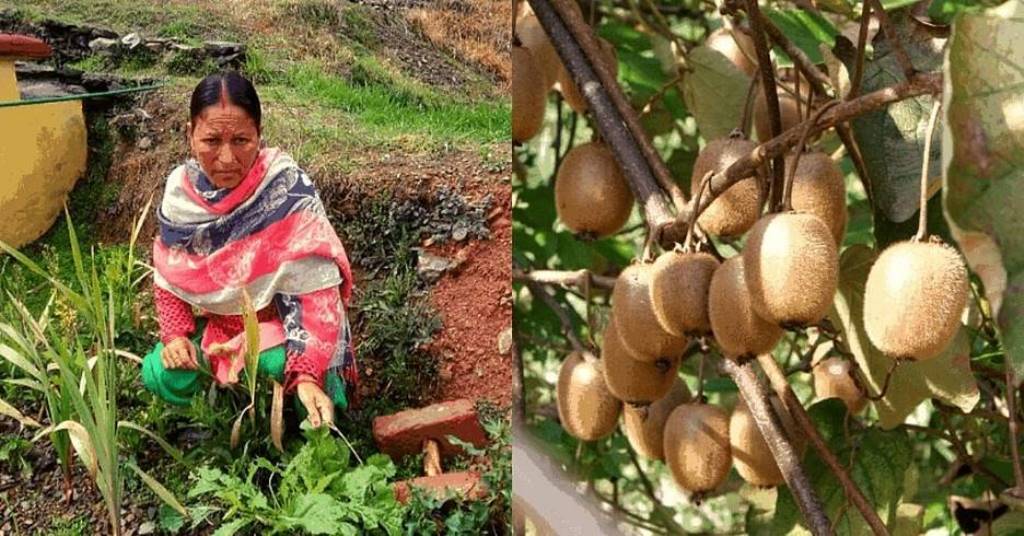
Sita Devi of Uttarakhand's Tehri District is a brilliant example of the sheer grit and perseverance with which women of the hills protect their land and livelihood in the mountains. Having faced failure, disapproval and doubt, she stands proud today as the “Kiwi Queen” of her land.
Agriculture has always been Sita's primary source of income. She farmed traditional crops such as ragi, millets, potatoes, and peas until 2018. However, the family harvest was frequently damaged by monkeys and wild animals. This often left Sita dejected to the point where she pondered abandoning farming entirely.
A discussion among members of her Duvakoti village's Self Help Group (SHG) enlightened her with Kiwi farming. This nutrient-dense fruit is produced on a steep hilly terrain that receives 700-800 chilling hours every year. To increase kiwi output, the National Horticulture Board provided farmers with financial aid to produce, store, pack, and sell the fruit on their fields.
"Believe it or not, I have discovered that monkeys do not even approach this fruit," Sita exclaims.
A Perseverance Journey
As wonderful as the concept was, she was initially mocked by local people for adopting it. Because kiwi is an unusual fruit, it was not widely acknowledged as a source of income.
Sita, on the other hand, saw potential in kiwi farming and decided to pursue it. She immediately contacted the Horticulture Department and participated in the training program offered under their scheme. The brave woman moved thousands of miles away to the Himachal Pradesh town of Solan defying the traditional customs but Sita says it was all worth it.
The program taught her how to seed, irrigate, harvest, and monetize the kiwi crop from start to finish. She explains, "Each plant must be placed two to four metres apart, as the trees grow enormous in size." Regular yet calibrated irrigation is essential for harvesting a good crop, but there is no need for additional fertilizers or equipment."
"Every now and then, I like to sprinkle the field with a little organic cow dung to offer some extra nutrients to the crop," she says. Later, the Horticulture Department constructed a drip irrigation system on her property, which completes plant watering in two hours while also saving water.
Her perseverance soon paid off. The first harvest yielded 40 kg of fruit. While part of it would be shared with friends and family, the remaining 30 kg earned her Rs.15000 from Tehri's local markets alone.
She now has 33 kiwi trees scattered across a land of two nali (0.98 acres). This year's harvest was harmed by hail storms, leaving only four trees with flowers to bear fruits.
"Growing kiwis is a wholesome labor in and in itself if properly cared for. It feeds my family with sweetness and sustains our living needs amply. If not this season, the trees will give fruit the rest of the season and help me cover up through trade at local marketplaces," she claims.
The Journey to "Queenhood"
When Sita's crop began to produce results, the sceptics surrounding her changed their minds. The horticulture department soon began providing seeds for kiwi planting to several farmers in her community.
Only her plants survived out of the 45 farmers who started farming.
She attributes this success to her personalized crop care. "The plant has several benefits, but it necessitates systematic stem pruning. Most individuals like enjoying the benefits but are inconsistent in putting in the effort necessary to tend for the fruits," she explains. Sita would tend to the crop almost like caring for her children. Perhaps this is why when the locals began referring to her as the "Kiwi Queen," it was not only appropriate, but also justified.
According to Sita, hardships have no bearing on one's ability to earn a living. "It is critical not to give up and to find what works for you within the constraints that you have."
She married early and had to drop out of school. Her husband, with whom she has two sons, works as a driver.
Despite the obvious commitments that come with being a mother, a wife, and a woman, she devoted her life to ensuring that her property was well-maintained. Sita claims that her name has become synonymous with dignity across the Tehri area, transcending the bounds of personal subsistence.










